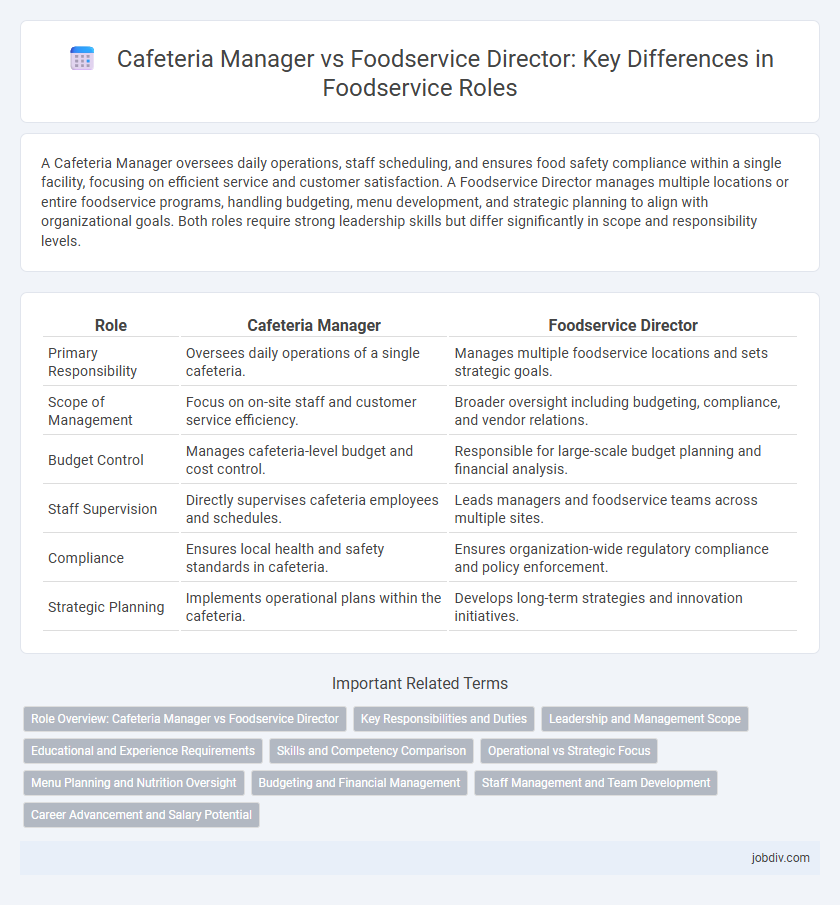A Cafeteria Manager oversees daily operations, staff scheduling, and ensures food safety compliance within a single facility, focusing on efficient service and customer satisfaction. A Foodservice Director manages multiple locations or entire foodservice programs, handling budgeting, menu development, and strategic planning to align with organizational goals. Both roles require strong leadership skills but differ significantly in scope and responsibility levels.
Table of Comparison
| Role | Cafeteria Manager | Foodservice Director |
|---|---|---|
| Primary Responsibility | Oversees daily operations of a single cafeteria. | Manages multiple foodservice locations and sets strategic goals. |
| Scope of Management | Focus on on-site staff and customer service efficiency. | Broader oversight including budgeting, compliance, and vendor relations. |
| Budget Control | Manages cafeteria-level budget and cost control. | Responsible for large-scale budget planning and financial analysis. |
| Staff Supervision | Directly supervises cafeteria employees and schedules. | Leads managers and foodservice teams across multiple sites. |
| Compliance | Ensures local health and safety standards in cafeteria. | Ensures organization-wide regulatory compliance and policy enforcement. |
| Strategic Planning | Implements operational plans within the cafeteria. | Develops long-term strategies and innovation initiatives. |
Role Overview: Cafeteria Manager vs Foodservice Director
A Cafeteria Manager oversees daily operations within a single foodservice location, focusing on staff management, inventory control, and customer service to ensure efficient meal preparation and delivery. A Foodservice Director holds a broader role, responsible for strategic planning, budgeting, and compliance across multiple sites or an entire foodservice system. Both roles prioritize food safety and quality but differ significantly in scope, with the director managing overall organizational goals and the cafeteria manager handling on-the-ground execution.
Key Responsibilities and Duties
Cafeteria Managers oversee daily operations within a single foodservice location, managing staff schedules, inventory control, and ensuring compliance with health and safety standards. Foodservice Directors hold broader responsibilities, including strategic planning, budget management, and vendor negotiations across multiple sites or entire organizations. Both roles prioritize food quality and customer satisfaction but differ significantly in scope and leadership level.
Leadership and Management Scope
Cafeteria Managers oversee daily operations within a single foodservice location, managing staff schedules, food quality, and customer satisfaction to ensure smooth service. Foodservice Directors hold a broader leadership role, responsible for strategic planning, budgeting, compliance, and supervising multiple foodservice outlets or facilities. Their management scope includes policy development, staff training programs, and long-term operational goals across the entire organization.
Educational and Experience Requirements
Cafeteria Managers typically require a high school diploma or associate degree with 2-4 years of experience in foodservice operations, focusing on daily management and staff supervision in smaller settings. Foodservice Directors often need a bachelor's degree in nutrition, dietetics, hospitality, or a related field, along with 5-7 years of progressive leadership experience, emphasizing strategic planning, budgeting, and compliance in larger, complex foodservice environments. Certification such as ServSafe or Certified Food Protection Manager (CFPM) is valuable for both roles to ensure food safety and regulatory adherence.
Skills and Competency Comparison
Cafeteria Managers excel in operational skills, including staff supervision, inventory control, and daily food preparation oversight, ensuring smooth cafeteria functionality. Foodservice Directors possess strategic competencies such as budget management, menu planning, compliance with health regulations, and staff training development, driving overall organizational efficiency. Both roles require strong leadership and customer service abilities, but Foodservice Directors emphasize long-term planning and policy implementation more heavily.
Operational vs Strategic Focus
A Cafeteria Manager primarily oversees daily foodservice operations, ensuring efficient workflow, staff management, and quality control within a specific location. In contrast, a Foodservice Director takes a strategic role, developing long-term plans, budgeting, and implementing policies across multiple units or an entire organization. The operational focus of Cafeteria Managers contrasts with the Foodservice Director's emphasis on strategic leadership and organizational growth.
Menu Planning and Nutrition Oversight
Cafeteria Managers primarily focus on daily menu planning, ensuring meals meet standard nutritional guidelines and accommodate specific dietary restrictions. Foodservice Directors oversee comprehensive nutrition programs, developing long-term menu strategies aligned with health regulations and organizational goals. Their role includes analyzing nutritional trends and coordinating with dietitians to enhance meal quality and compliance across multiple venues.
Budgeting and Financial Management
Cafeteria Managers primarily focus on overseeing daily budget allocations, managing food and labor costs to ensure operational efficiency within individual facilities. Foodservice Directors take a broader approach, developing comprehensive financial strategies that encompass multiple locations, long-term budgeting, and cost control measures to optimize overall profitability. Expertise in financial reporting, forecasting, and resource allocation distinguishes Foodservice Directors in managing large-scale budgets compared to Cafeteria Managers.
Staff Management and Team Development
Cafeteria managers focus on day-to-day staff supervision, scheduling, and frontline team training to ensure smooth foodservice operations. Foodservice directors oversee broader staff management strategies, including hiring, policy development, and leadership training programs across multiple units. Emphasizing team development, directors implement long-term workforce planning and professional growth initiatives to enhance overall service quality.
Career Advancement and Salary Potential
Cafeteria managers typically oversee daily operations within individual facilities, gaining hands-on experience that can lead to roles with broader responsibilities such as foodservice directors, who manage multiple locations or entire foodservice programs. Foodservice directors command higher salaries, often reflecting their strategic role in budgeting, staff management, and compliance across complex operations. Career advancement from cafeteria manager to foodservice director requires skill development in leadership, financial planning, and regulatory knowledge, positioning professionals for elevated earning potential and greater organizational impact.
Cafeteria Manager vs Foodservice Director Infographic

 jobdiv.com
jobdiv.com